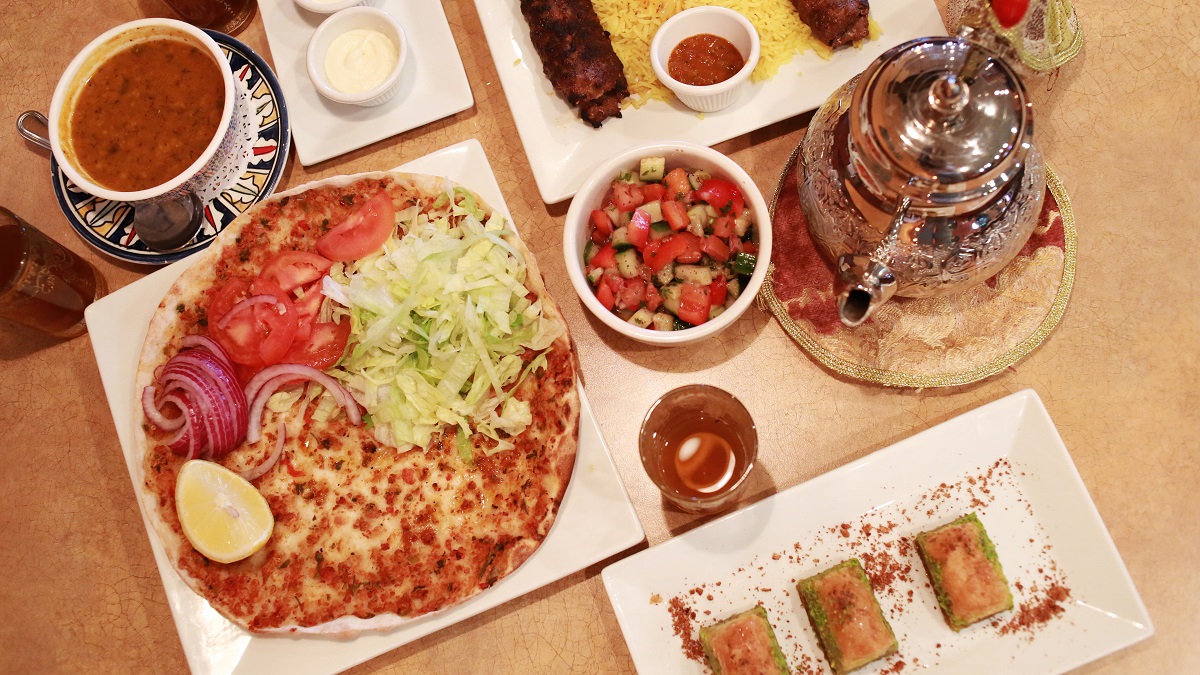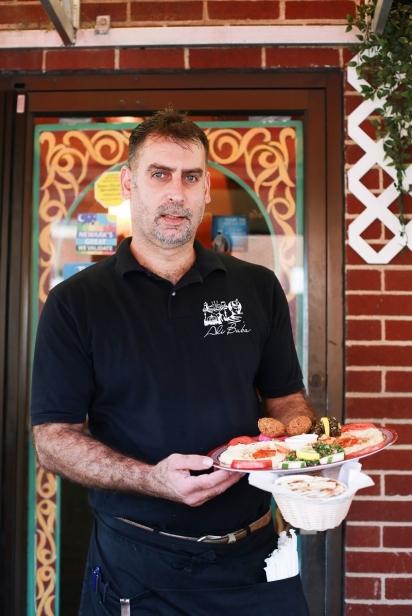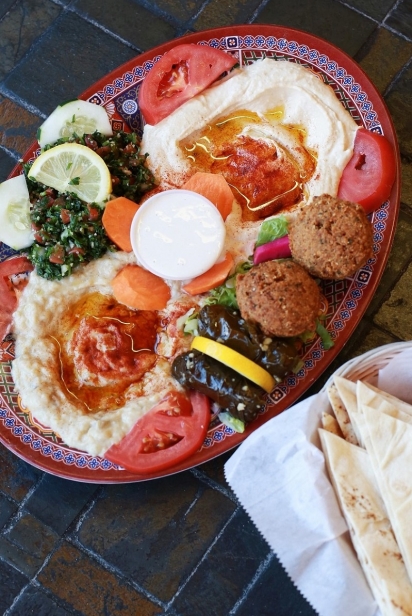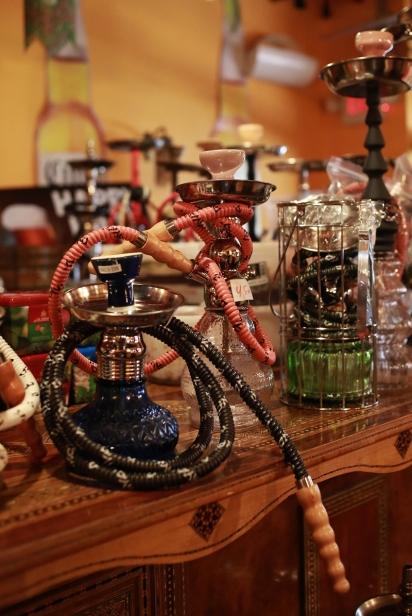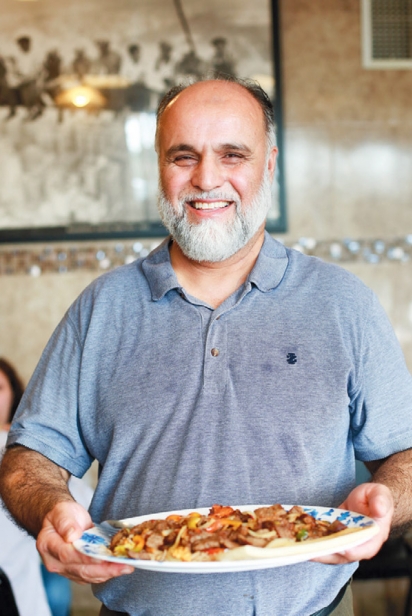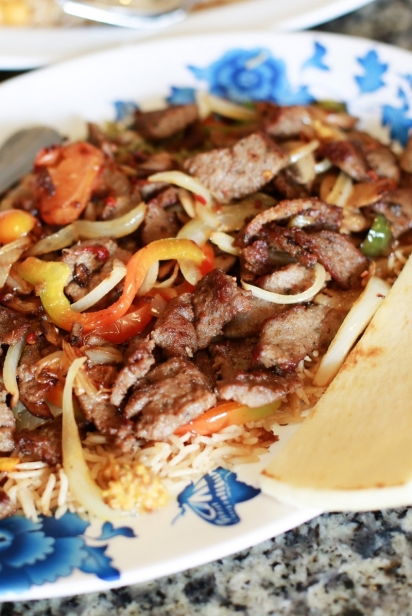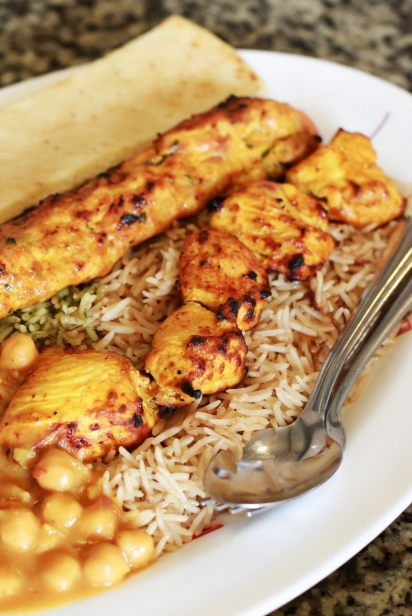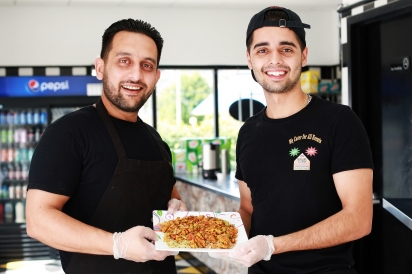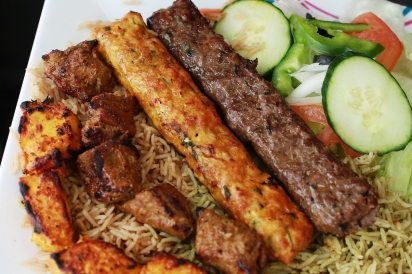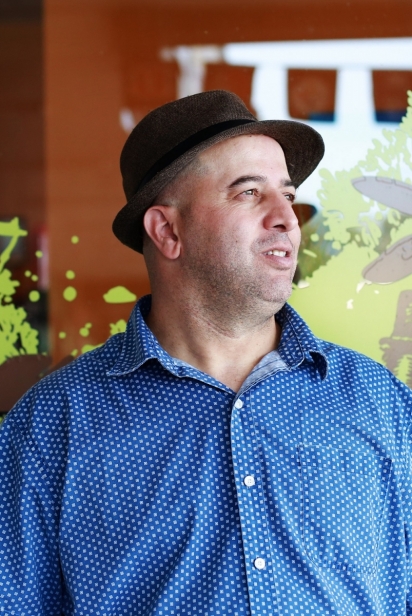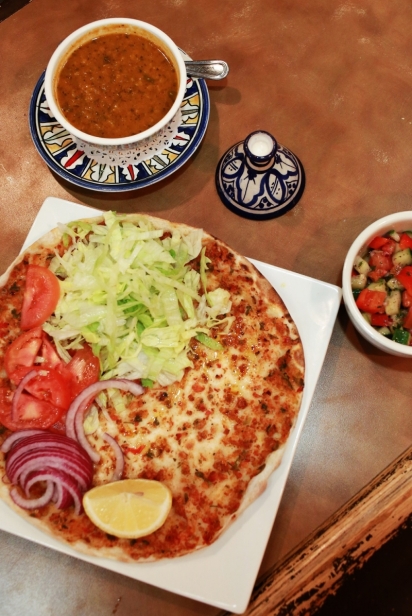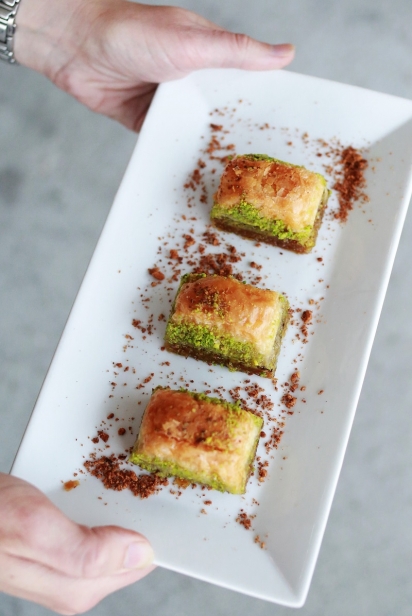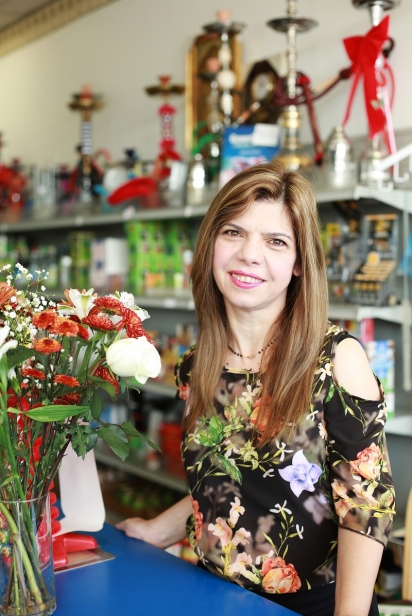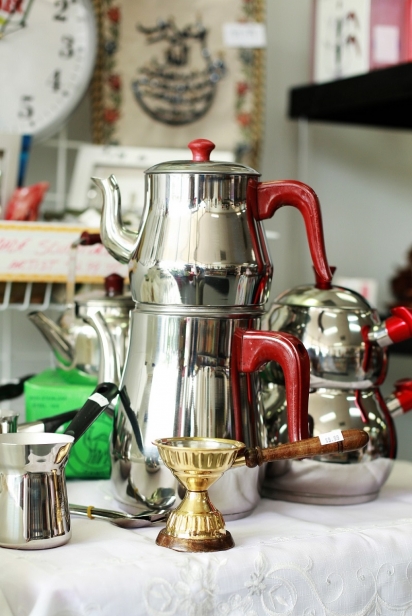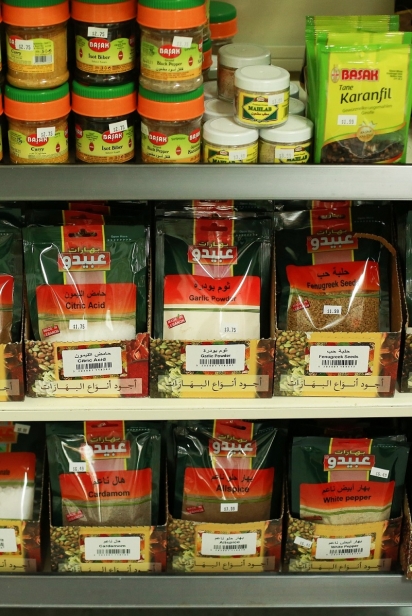Middle Eastern Eats in Newark
Growing up in France with Turkish immigrant parents exposed me to two things: buttery croissants and over-the-top hospitality. Like a lot of Middle Easterners, Turkish people pride themselves in being excellent hosts, something I experienced during our yearly trips to my parents’ homeland.
Every August, I watched my grandfather, a dried-fruit broker, drive to his suppliers to prepare for the new trading season. One year, he showed up unannounced, family in tow, to one of the farmers’ home. Somehow, this didn’t faze his gracious hosts who, within an hour, whipped up a homemade meal of cumin-scented meatballs and tomato-stewed green beans to the five of us (Turkish housewives sure know how to work their freezer.) Our hosts didn’t make us feel like we imposed on them – judging from their smiles, they looked honored for the opportunity to feed us.
Now an immigrant myself, I’ve discovered new foods (crab cakes!) and the only time I show up unannounced is on Halloween. Still, I occasionally miss the sun-kissed food of my childhood and the sense of hospitality it evokes. When that happens, I don’t browse travel sites, but head straight to Newark, Delaware. The college town is home to a bustling Middle Eastern-inspired food scene, thanks in part to the Saudi and Turkish community calling the University of Delaware campus home. Stop by these eateries next time you crave a falafel sandwich with a side of TLC.
Ali Baba
Open since 2001, this Newark institution has introduced legions of food lovers to Middle Eastern staples like crisp falafel (chickpea fritters) and fattoush salad (Lebanese bread salad) in a Moroccan-inspired décor. For the full Ali Baba experience, walk through the hookah bar and follow the lively Arabic tunes to the dining area. Sit on a sofa bench, tuck a velvet pillow behind your back, and browse through the extensive menu.
To first timers, co-owner Bashar Albarouki recommends the Vegetarian Platter. Listed as an appetizer, the dish can double as a hearty entrée, where golf ball size falafels, lemon-scented stuffed grape leaves, and parsley-speckled tabbouleh deliver a vibrant mix of flavors and textures. Dip the lavash bread in baba ganouj, a velvety eggplant spread, and creamy hummus, and you’ll forget you’re in Newark. The service is attentive, so stay awhile and order the pistachio baklava for dessert.
The winning combination of freshly made food and welcoming atmosphere has brought regular diners for almost two decades. “Some of our customers have come since day one,” says Albarouki, “and we’ve seen babies grow into college students.”
Ali Baba Restaurant, 175 East Main Street, Facebook
Gyro Kabob House
When owner Akram Niazi bought an old pizzeria in 2007, he intended to turn it into a kabob house. “But at the time,” he explains, “people didn’t know what kabobs were.” So Niazi adapted. He first named the business Bella Pizzeria and Kabobs, eventually settling on Gyro Kabob House. “People knew what Greek gyros were,” he says.
Over a decade later, the take-out joint has reached cult status. Gyro Kabob House has an average of 226 4.5-star reviews on Yelp and customers lining up for the gyros (“the best within 50 miles” according to a reviewer.) The true gems, however, are the Afghan-inspired dishes. Consider the lamb shshlik, a generous plate of perfectly seasoned lamb shavings with sautéed onions and peppers served on a bed of spinach and cilantro rice. Or try the chicken tika and kofta, which delivers chicken in both ground and cubed forms, along with chickpeas, rice, and bread. If you find space at one of the four tables, grab the bottle of tangy white sauce from the cooler and drizzle your food liberally.
An Afghan-native, Niazi is grateful for the success he found in this country. When he came to the US, he was 18, had no degree and didn’t speak English. What he did have was the desire to learn and the determination to support his family. Learning the ropes of the restaurant world, first in San Francisco, then in New York City, set him up for success. “In this country,” he says, “you have a chance if you work hard.”
Gyro Kabab House, 1142 Christiana Road,
Halal Gyro Kabob House
Having grown up at his dad’s Gyro Kabob House, Ahmad Niazi had the restaurant life in his veins. However, he hadn’t planned on opening a restaurant. He was pursuing a degree in cyber security when his brother-in- law, Waheed Shamsi, told him about a potential spot in downtown Newark for a restaurant – their restaurant. The call reignited his passion for food. He placed his studies on hold and, by Thanksgiving 2018, Halal Gyro Kabob House was born.
The take-out place offers the same items that made the Christiana location popular, namely, the gyros, perfectly seasoned kabobs, and white sauce. What differentiates the Newark location is the patrons. “75% of our customers are University of Delaware students with no car,” explains Shamsi. The customers’ lifestyle has influenced the offering, so you’ll also find platters designed to be shared. The Family Special will feed two to four people, thanks to the four kabobs featuring three kinds of meat. The most opulent item on the menu is the Matari: imagined for post-partying students, the meal offers a mix of chicken, lamb, rice, vegetables, and chickpeas.
Shamsi and Niazi have built family at the heart of the business and restaurant. “In our culture, family is important,” explain the cofounders, “and we want to treat customers like family.” As such, free chai is offered to anyone who walks in the door. It’s the Afghan way to say welcome.
240 E. Delaware Avenue, Facebook
Olive Tree Café
Elias Rhanim describes himself as an ambassador of Mediterranean food. “It’s simply prepared, healthy food,” explains the Moroccan-born chef, “and I want to promote that.” At Olive Tree Café, the restaurant he opened with his wife Stephanie Ferrell, he does that with a diverse menu featuring Greek spanakopita, Spanish paella, and Moroccan tagines. The Middle East is represented through falafel and hummus and a selection of lesser-known Turkish dishes.
Take the lahmacun for instance – this flatbread “pizza” is sprinkled with a thin layer of ground lamb and eaten rolled like a crêpe. At the café, it’s served with a bowl of choban (shepherd) salad, a chopped vegetable salad in a tangy sumac-pomegranate dressing. The food is expertly seasoned, with just enough spice to excite the taste buds. “My [American] wife had the final say on the heat level of all the recipes,” says Rhanim. Translation: go ahead and order the Adana kebap. And if Rhanim ever offers real Moroccan mint tea, clear your schedule and say yes!
In less than five years, the olive-oil laced dishes have drawn a loyal tribe of supporters. Lunch tables fill quickly, and some customers dine in several times a week. True to his ambassador role, Rhanim is now working on a food truck concept to bring the flavors of the Mediterranean closer to people. Watch for The Rolling Olive by Olive Tree Café by the University of Delaware Stadium this coming spring; gyros will be waiting for you at the window.
Olive Tree Cafe, 13 Chestnut Hill Plaza, Facebook
Zahra International Food Market
Pomegranate molasses. Dried limes. Zaatar. Community. These are some of the things you’ll find at Zahra International Market. On any given day, owner Jacqueline Karam (above, in the Market) sips freshly made Turkish coffee with a customer. The language spoken will change – sometimes it’s English, other times it’s Arabic – but the hospitality doesn’t.
A former French teacher in Lebanon, Karam moved to Newark in 2016 to join her husband, a finance manager at a Porter dealership. After buying the store from its previous, Turkish-born owner, she expanded the product offering to turn Zahra’s into a one-stop shop for Middle Eastern essentials. You can spend hours studying the store’s tidy shelves before filling your basket with imported olive oils, bottles of orange blossom water, and jars of sumac. I don’t leave without a chat (in French!) with Karam and several jars of halva, a melt-in-your mouth, tahini-based candy slowly gaining popularity in the US.
Customers drive from afar to stock up on halal products and interact with the owner “because she’s so nice.” If she pulls a chair for you, have a seat, and watch the customers confide in the owner while you drink your coffee. An Iranian immigrant may ask for ayran, a salted yogurt drink, and share memories of a trip to Lebanon. A Saudi student may inquire for fresh mint and leave with a box of dates. You’ll never feel alone at Zahra International Market and that, to me, is what Middle Eastern hospitality is all about.
Zahra International Foods Market, 620 Newark Shopping Center, Facebook


